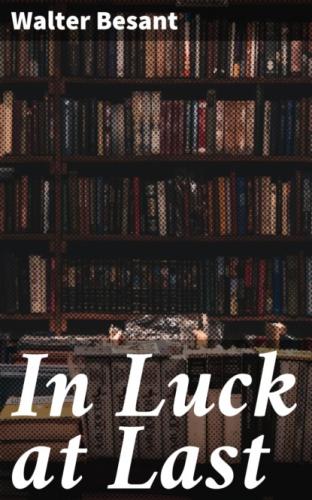Walter Besant
In Luck at Last
Published by Good Press, 2019
EAN 4064066163815
Table of Contents
A YACHTSMAN'S YARN.
CHAPTER I.
WITHIN THREE WEEKS
If everyone were allowed beforehand to choose and select for himself the most pleasant method of performing this earthly pilgrimage, there would be, I have always thought, an immediate run upon that way of getting to the Delectable Mountains which is known as the Craft and Mystery of Second-hand Bookselling. If, further, one were allowed to select and arrange the minor details—such, for instance, as the "pitch" and the character of the shop, it would seem desirable that, as regards the latter, the kind of bookselling should be neither too lofty nor too mean—that is to say, that one's ambition would not aspire to a great collector's establishment, such as one or two we might name in Piccadilly, the Haymarket, or New Bond Street; these should be left to those who greatly dare and are prepared to play the games of Speculation and of Patience; nor, on the other hand, would one choose an open cart at the beginning of the Whitechapel Road, or one of the shops in Seven Dials, whose stock-in-trade consists wholly of three or four boxes outside the door filled with odd volumes at twopence apiece. As for "pitch" or situation, one would wish it to be somewhat retired, but not too much; one would not, for instance, willingly be thrown away in Hoxton, nor would one languish in the obscurity of Kentish Town; a second-hand bookseller must not be so far removed from the haunts of men as to place him practically beyond the reach of the collector; nor, on the other hand, should he be planted in a busy thoroughfare—the noise of many vehicles, the hurry of quick footsteps, the swift current of anxious humanity are out of harmony with the atmosphere of a second-hand bookshop. Some suggestion of external repose is absolutely necessary; there must be some stillness in the air; yet the thing itself belongs essentially to the city—no one can imagine a second-hand bookshop beside green fields—so that there should be some murmur and perceptible hum of mankind always present in the ear. Thus there are half-a-dozen bookshops in King William Street, Strand, which seem to enjoy every possible advantage of position, for they are in the very heart of London, but yet are not exposed to the full noise and tumult of that overflowing tide which surges round Charing Cross. Again, there are streets north of Holborn and Oxford Street most pleasantly situated for the second-hand bookseller, and there are streets where he ought not to be, where he has no business, and where his presence jars. Could we, for instance, endure to see the shop of a second-hand bookseller established in Cheapside?
Perhaps, however, the most delightful spot in all London for a second-hand bookshop is that occupied by Emblem's in the King's Road, Chelsea.
It stands at the lower end of the road, where one begins to realize and thoroughly feel the influences of that ancient and lordly suburb. At this end of the road there are rows of houses with old-fashioned balconies; right and left of it there are streets which in the summer and early autumn are green, yellow, red, and golden with their masses of creepers; squares which look as if, with the people living in them, they must belong to the year eighteen hundred; neither a day before nor a day after; they lie open to the road, with their gardens full of trees. Cheyne Walk and the old church, with its red-brick tower, and the new Embankment, are all so close that they seem part and parcel of the King's Road. The great Hospital is within five minutes' walk, and sometimes the honest veterans themselves may be seen wandering in the road. The air is heavy with associations and memories. You can actually smell the fragrance of the new-made Chelsea buns, fresh from the oven, just as you would a hundred years
